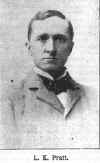her people, but he does not believe that a country devoted entirely to agricultural pursuits the kind of a country to do a satisfactory and lucrative law practice.
In his younger days he became addicted to the use of intoxicants, which habit grew upon him and became the bane of his prospects in life for a long time.
He made honest endeavors to quit the pernicious habit and was always held up by his friends, but the cruel vice had fastened its fetters upon him and it seemed almost impossible for him to break away.
December 1891 he went to Dwight, Illinois, and took the Keeley treatment, graduating, as they call it, on the 18th day of January 1892, since which time nothing of an intoxicating nature has passed his lips, even to sweet cider.
He is an enthusiast on the Keeley treatment and looks on the 18 of January 1892 as one of the greatest epochs in his life.
He has been liberaI giving time and money to assist others to take the cure and the result in and about Norton speaks for itself.
He has no apologies for taking the cure himself and freely says that it was the proudest act of his life.
 Louis Kossuth Pratt was born in Madison county, Ohio, on February 14, 1852.
He was raised on a farm; attended the common schools, and also a select school and Wittenberg college at Springfield, Ohio.
Afterwards he attended college at Coliege Springs, Iowa, for two years.
Louis Kossuth Pratt was born in Madison county, Ohio, on February 14, 1852.
He was raised on a farm; attended the common schools, and also a select school and Wittenberg college at Springfield, Ohio.
Afterwards he attended college at Coliege Springs, Iowa, for two years.
In 1869 he left Ohio and removed to Page county, Iowa, where he commenced studying law, studying off and on until 1877.
In the meantime he lived three years in Mobile, Alabama. He went to Yankton, Dakota, and from there back to Iowa, in 1876, and resumed the study of law.
In 1877 he determined to locate somewhere in northwestern Kansas. Left Iowa going through Council Bluffs and by rail to Hastings, Nebraska; and from there across the country to Smith Center. Kansas.
Remained there a couple of days and came to Kirwin. There he met and had a long talk with Col. W. T. S. May, who strongly advised him to locate at Norton.
He came to Norton, traveling from Logan with a Mr. Townsend, who at that time lived in Decatur county, and afterward died there; reached Norton on the evening of October 18, 1887, and as they came over the raise from Prairie Dog at night saw about ten or fifteen lights winking here and there over the town site of Norton.
C. W. Posson kept the Commercial House, "the only first class house in the city."
It was a log cabin about 18x20 with a lean-to made out of rough boards in the rear.
He immediately commenced, or tried to commence, the practice of law, but there was not very much law to practice at the time.
The Judge says: "The first law suit that I ever remember of trying in my life was one before Squire Ellis, on the Sappa, in December 1877.
Dr. Simmons was plaintiff and Mr. McGuire was defendant. It was one of those justly celebrated corn stalk and buffalo grass cases.
The whole country there was at the trial, including quite a delegation from Nebraska.
It commenced raining about as soon as we got over there, and rained all the time we were there.
This very important suit took three days to dispose of and resulted in a verdict of $5, as I remember, or $6, for Dr. Simmons.
It was tried before a jury, and an audience of, I should say, twenty or thirty men.
Some of them traveled quite a distance to hear it. The three days that we were over there we had the heaviest rain that has probably ever fallen in that part of the state, from that day to this.
It rained continuously, night and day, for about three days and ended in a snow storm.
At that time there was nothing but sod roofs on
|